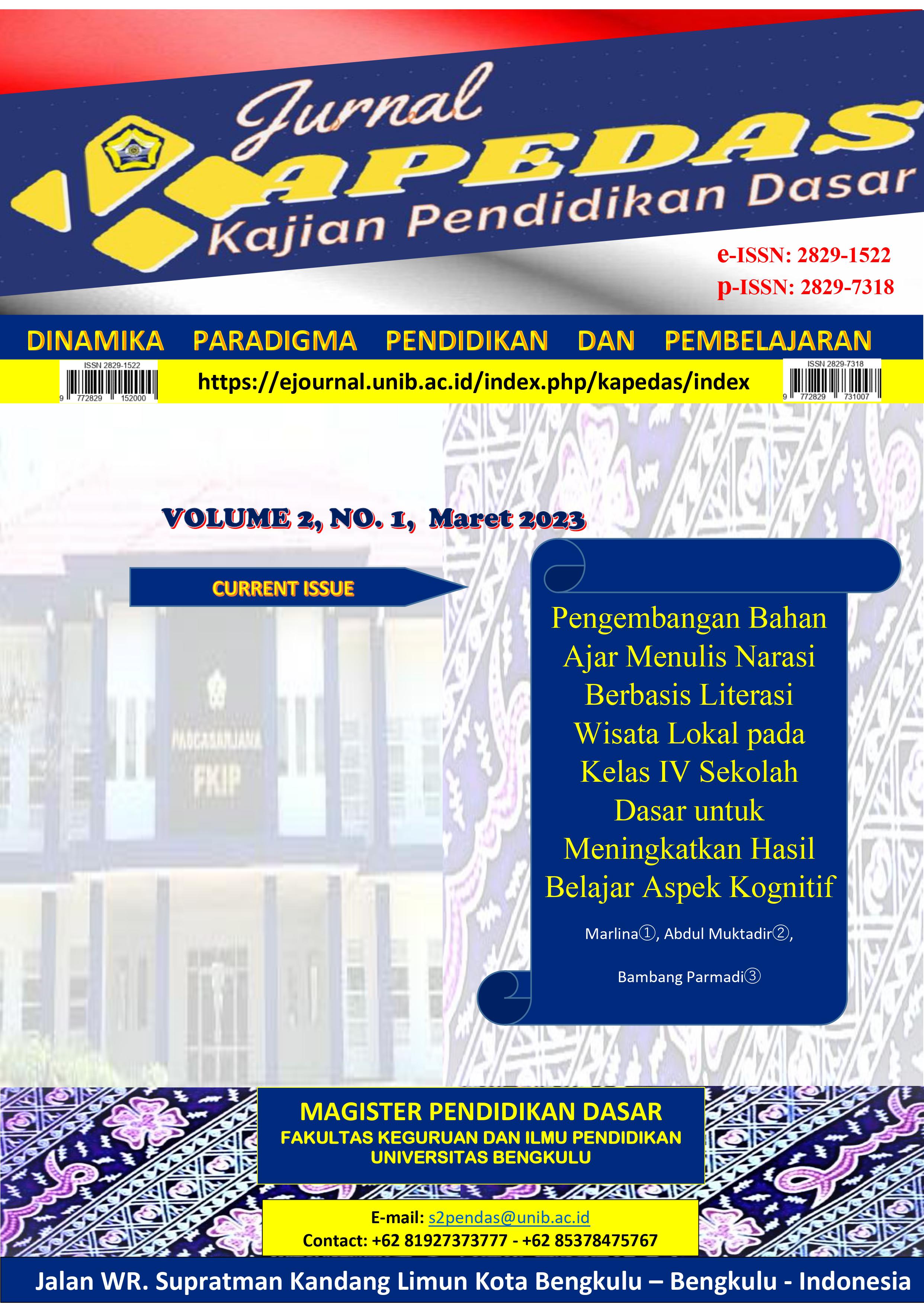Main Article Content
Abstract
This study aims to develop LKPD oriented scientific approach in improving students' science process skills and determinity the feasibility, practicality and effectiveness of LKPD on the material properties of objects. The research and development procedure used the ADDIE model which was: analysis, design, development, implementation and evaluation. The results of the study based on the validator's assessment of the material aspect obtained an average score of 0.85, the language aspect is 0.86 and the media aspect is 0.89. From these three aspects, the overall average is taken, the value of 0.86 is obtained in the very valid category. The results of student responses to the product obtained an average score of 81.56 in the very practical category. While the results of the effectiveness show that the scientific approach-oriented worksheets are very effective in improving students' science process skills. Based on the results of the assessment, it can be concluded that the scientific approach-oriented worksheets developed are very valid, practical and effective for use in the science learning process in improving students' science process skills.
Keywords
Article Details
Copyright (c) 2023 Pingsi Anggriani, Irwan Koto, Endang Widi Winarni

This work is licensed under a Creative Commons Attribution-ShareAlike 4.0 International License.

Karya ini dilisensikan di bawah Creative Commons Attribution-ShareAlike 4.0 International License .
References
- Arief, F. (2020). Pengembangan Lembar Kerja Siswa Berfikir Kritis Pada Materi Learning Pada Materi Animalia. Unnes Of Biology Education, 1 (2 ): 47-53
- Arikunto, S. (2012). Dasar-Dasar Evaluasi Pendidikan. Jakarta: Bumi Aksara
- Christiyoda, S., Widoretno, S., & Karyanto, P. (2016). Pengembangan Modul Berbasis Kemampuan Pemecahan Masalah Untuk Meningkatkan Berpikir Kritis. Jurnal Pendidikan, 5 (1): 145
- Dewi, P. S. & Rochintaniawati, D. (2016). Pengembangan LKPD Untuk Meningkatkan Kemampuan Proses Sains Siswa Melalui Pendekatan Saintifik Dalam Embelajaran IPA Terpadu Pada Tema Global Warming. Jurnal Edusains, 8 (1): 18-26.
- Hamalik, O. (2010.) Proses Belajar Mengajar. Jakarta: Bumi Aksara
- Istianah, Widodo, J., & Prasetya, E. (2016). Pengembangan Bahan Ajar dengan Pendekatan Metakognisi Pada Materi Permintaan dan Penawaran Kelas X SMA Negeri 3 Demak. JESS, 1 (1): 31-36.
- Kaymakci, S. (2012). A Review of Studies of Worksheets in Turkey. J. US-ChinaEducation Review A 1 (2012): 57-6.
- Ratini. (2020). Penggunaan Multimedia Interaktif Untuk Meningkatkan Aktivitas Dan Hasil Belajar Biologi Pada Siswa SMA Muhammadiyah 1 Metro, Jurnal Pendidikan. 2 (1): 11-29
- Savitri, F., Budi,A.S., & Marpaung,M.A. (2015). Pengembangan Lembar Kerja Siswa Materi Suhu dan Kalor Berbasis Scientific Method Untuk Meningkatkan Keterampilan Proses Sains. [Online]. Prosiding Seminar Nasional Fisika (E-Journal).IV (2),
- Sugiyono. (2015). Metode Penelitian Kuantitatif, Kualitatif, dan R & D. Bandung: Alfabeta.
- Susilana & Ihsan. (2014). Pendekatan Saintifik dalam Implementasi Kurikulum
- Berdasarkan Kajian Teori Psikologi Belajar. Edutech: Jurnal
- Universitas Pendidikan Indonesia, 1 (2) : 1-2
- Suyanto, E., & Sartinem (2009). Pengembangan Contoh Lembar Kerja Fisika Siswa Dengan Latar Penuntasan Bekal Awal Ajar Tugas Studi Pustaka dan Keterampilan Proses Untuk Meningkatkan Kreatif Siswa di SMA Negeri 3 Bandar Lampung. Prosiding Seminar Nasional Pendidikan. Yogyakarta: Universitas Negeri Yogyakarta.
- Syahputra, H. H., Hasruddin., & Djulia, E. (2015). Pengembangan Media Ajar Interaktif Biologi Berbasis Macromedia Flash Pada Materi Sistem Pencernaan Makanan Manusia Untuk Kelas XI SMA/MA. Jurnal Pendidikan Biologi 3 (6): 255-259
- Trianto. (2010). Mendesain Model Pembelajaran Inovatif-Progresif: Jakarta: Kharisma Putra Utama.
- Winarni, E.W., (2018). Teori & Praktik: Penelitian Kuantitatif, Kualitatif: Penelitian Tindakan Kelas (PTK) Research And Development (R&D). Bandung: Bumi Aksara
- Yildirim N, Sevil K, & Alipasa A. (2011). The Effect Of The Worksheet on Student’s Achievement in Chemical Equilibrium. Journal of Turkish Science Education, 8 (3): 44-58.
References
Arief, F. (2020). Pengembangan Lembar Kerja Siswa Berfikir Kritis Pada Materi Learning Pada Materi Animalia. Unnes Of Biology Education, 1 (2 ): 47-53
Arikunto, S. (2012). Dasar-Dasar Evaluasi Pendidikan. Jakarta: Bumi Aksara
Christiyoda, S., Widoretno, S., & Karyanto, P. (2016). Pengembangan Modul Berbasis Kemampuan Pemecahan Masalah Untuk Meningkatkan Berpikir Kritis. Jurnal Pendidikan, 5 (1): 145
Dewi, P. S. & Rochintaniawati, D. (2016). Pengembangan LKPD Untuk Meningkatkan Kemampuan Proses Sains Siswa Melalui Pendekatan Saintifik Dalam Embelajaran IPA Terpadu Pada Tema Global Warming. Jurnal Edusains, 8 (1): 18-26.
Hamalik, O. (2010.) Proses Belajar Mengajar. Jakarta: Bumi Aksara
Istianah, Widodo, J., & Prasetya, E. (2016). Pengembangan Bahan Ajar dengan Pendekatan Metakognisi Pada Materi Permintaan dan Penawaran Kelas X SMA Negeri 3 Demak. JESS, 1 (1): 31-36.
Kaymakci, S. (2012). A Review of Studies of Worksheets in Turkey. J. US-ChinaEducation Review A 1 (2012): 57-6.
Ratini. (2020). Penggunaan Multimedia Interaktif Untuk Meningkatkan Aktivitas Dan Hasil Belajar Biologi Pada Siswa SMA Muhammadiyah 1 Metro, Jurnal Pendidikan. 2 (1): 11-29
Savitri, F., Budi,A.S., & Marpaung,M.A. (2015). Pengembangan Lembar Kerja Siswa Materi Suhu dan Kalor Berbasis Scientific Method Untuk Meningkatkan Keterampilan Proses Sains. [Online]. Prosiding Seminar Nasional Fisika (E-Journal).IV (2),
Sugiyono. (2015). Metode Penelitian Kuantitatif, Kualitatif, dan R & D. Bandung: Alfabeta.
Susilana & Ihsan. (2014). Pendekatan Saintifik dalam Implementasi Kurikulum
Berdasarkan Kajian Teori Psikologi Belajar. Edutech: Jurnal
Universitas Pendidikan Indonesia, 1 (2) : 1-2
Suyanto, E., & Sartinem (2009). Pengembangan Contoh Lembar Kerja Fisika Siswa Dengan Latar Penuntasan Bekal Awal Ajar Tugas Studi Pustaka dan Keterampilan Proses Untuk Meningkatkan Kreatif Siswa di SMA Negeri 3 Bandar Lampung. Prosiding Seminar Nasional Pendidikan. Yogyakarta: Universitas Negeri Yogyakarta.
Syahputra, H. H., Hasruddin., & Djulia, E. (2015). Pengembangan Media Ajar Interaktif Biologi Berbasis Macromedia Flash Pada Materi Sistem Pencernaan Makanan Manusia Untuk Kelas XI SMA/MA. Jurnal Pendidikan Biologi 3 (6): 255-259
Trianto. (2010). Mendesain Model Pembelajaran Inovatif-Progresif: Jakarta: Kharisma Putra Utama.
Winarni, E.W., (2018). Teori & Praktik: Penelitian Kuantitatif, Kualitatif: Penelitian Tindakan Kelas (PTK) Research And Development (R&D). Bandung: Bumi Aksara
Yildirim N, Sevil K, & Alipasa A. (2011). The Effect Of The Worksheet on Student’s Achievement in Chemical Equilibrium. Journal of Turkish Science Education, 8 (3): 44-58.
